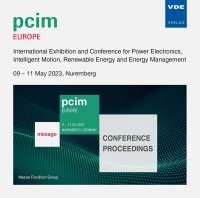How Life Cycle Analyses are Influencing Power Electronics Converter Design
Konferenz: PCIM Europe 2023 - International Exhibition and Conference for Power Electronics, Intelligent Motion, Renewable Energy and Energy Management
09.05.2023-11.05.2023 in Nürnberg, Germany
doi:10.30420/566091368
Tagungsband: PCIM Europe 2023
Seiten: 9Sprache: EnglischTyp: PDF
Autoren:
Musil, Franz; Harringer, Carina; Hiesmayr, Alfred; Schoenmayr, David (Fronius International GmbH, Austria)
Inhalt:
For decades, global warming has become one of the greatest challenges facing human society. Many consequences stem from this phenomenon, including accentuated natural disasters, climate refugees, air pollution issues, and much more. Furthermore, the availability of raw materials is limited and as their demand is growing, the waste of this sources is becoming more and more of an issue. To limit the devastating effects of climate change and linear economy it is important to develop optimally designed and sustainable products, considering all life cycle phases. To enable future conscious decisions, a scientific and fact-based understanding of the sustainability performance of products is necessary. A life cycle analysis (LCA) or life cycle assessment is one of the most common and internationally standardized scientific methods to analyze the environmental impact of a product over its entire life cycle. This paper will propose a practical case of how to perform an LCA for power electronics converters. Beside the typical electronic components, an evaluation, of the carbon footprint, between a Si-IGBT based power module and a SiC-MOSFET based module is made with the scope to compare the variant on the module components. Therefore addressing the trend of using SiC based semiconductors to increase the power density and efficiency of a system. In addition, results of an LCA for a GEN24 Solar Inverter are shown. By evaluating the results, it becomes clear what contribution power electronics and its components have on the environmental footprint. To improve future power electronics systems, a proposal is made on how to establish LCA analysis as another dimension in a multi-objective-optimisation of a power converter design. Because decisions in the development process of power electronics can make, due to the changed footprint, a significant positive contribution to climate change.


